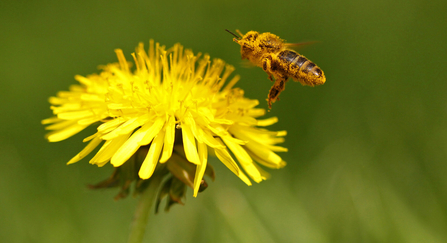The new year has barely begun and the Brexit transition period only just ended, but the government has swung into action to perform a fatal U-turn by authorizing the use of bee-killing pesticides that were subject to an EU-wide ban two years ago. To deal with the risk that neonicotinoids may be taken up by wildflowers which in turn poison pollinators, Defra has advised farmers to destroy flowers in and around the affected crops with herbicides, dealing a double blow to pollinators.
Government U-turn on pesticides at first opportunity

Neonicotinoids pose a significant environmental risk – particularly to our bees and other pollinators – and over the last decade hundreds of thousands of people across the UK have called for better protection of our bees, and for these highly toxic pesticides to be banned. Photo by Jon Hawkins - Surrey Hills Photography.
Is this what being unshackled from the EU means? The freedom to lower our environmental standards. The freedom to destroy wildflowers. The freedom to kill our bees. For the last few years the Government has promised to deliver a “Green Brexit” and set the global standard on environmental policies. This is not a good start.
Neonicotinoids pose a huge danger to the very pollinators we rely on and during a nature crisis we should be doing everything we can to restore nature, not destroy it. Authorizing even “limited or controlled” use of the pesticide is not a sustainable solution. The government needs to support farmers to find a permanent approach to the difficulties they face, not resort to a dangerous answer that destroys ecosystems and creates more problems than it solves.
There is a risk that this is just the thin end of the wedge. We have held fears that our environmental standards would be chipped away at and this is the first indication that our fears might be realized. Whilst others in the EU may also offer these emergency exceptions, it is not a positive precedent for the government to set.
